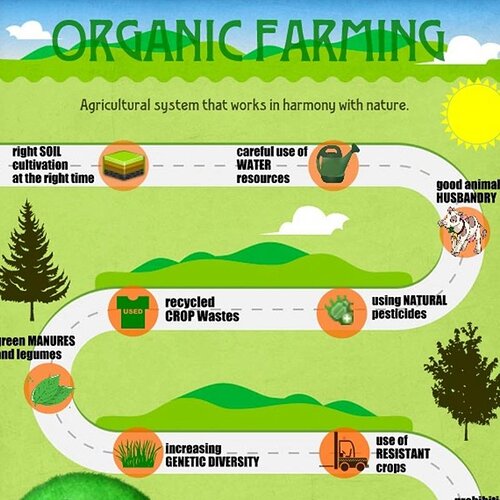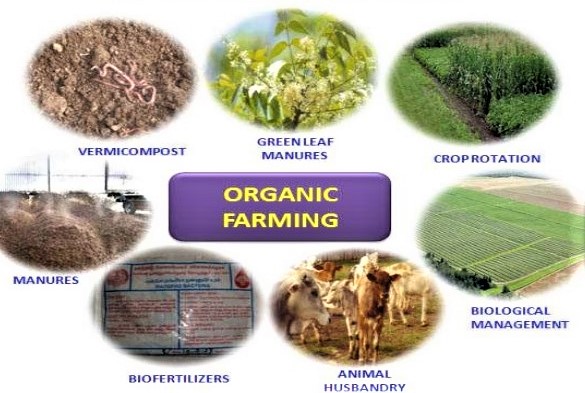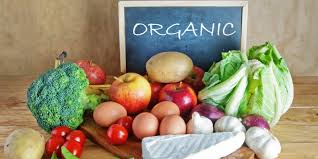Nature is the best teacher for farming. Whenever we hear about organic farming, the roots go back to India and China where farming sustained for more than 4000 years. Organic farming is a method of cultivating the land and growing crops in such a way to keep the health of the soil intact and keep the soil micro organisms alive by using organic waste materials like cattle waste, agricultural waste, aquatic waste etc. This also ensures use of beneficial micro organisms (Bio fertilizers) which makes soil and atmospheric nutrients available to the crops for increased crop production for an eco-friendly pollution free environment.
ADOPTATION OF ORGANIC FARMING IN INDIA
For various reasons, organic farming has been adopted by Indian farmers. First categories of organic farmers are those who are traditionally practicing the organic way of cultivation due to lack of availability of high intensive input resources. These farmers are following organic farming under compulsion as they are located in no-input or low input use zones. Second category of farmers include certified and un certified farmers who recently adopted organic farming after understanding the ill effects of conventional agriculture in terms of loss of soil fertility, food toxicity, increased input costs or decreasing market value. The third category of organic farmers include majority of certified farmers and enterprises which have emphasized on systematic adoption of organic cultivation in India to capture the emerging market opportunities and prices. The entire data available on organic agriculture today depends on the third category of commercial farmers and enterprises who are attracting most attention.
REGULATORY STRUCTURE
The certified organic agriculture has grown to almost 29 times from 42000 ha in 2003-04 to 4.48 million ha by the end of March 2010. Out of 4.48 million hectares of organic certification land, 1.98 million ha accounts for cultivated land area and remaining 3.4 million ha is a wild forest harvest area. India accounts for around 50 % of total organic growers in the world because of the small holdings with each producer. The regulatory mechanism for organic products comes from National Programme on Organic Production (NPOP) which is regulated under two different acts for export and domestic markets.
The country’s organic product export requirement will be looked after by NPOP notified under Foreign Trade Development and Regulation Act (FTDR). USDA has also accepted the conformity assessment of NPOP so that the product certified under NPOP by any Indian certification agency can be exported to Sweden, Europe and USA without the requirement of re-certification. NPOP has been notified under Agriculture Produce Grading, Marking and Certification Act (APGMC) to look after import and domestic market. There are around 18 accredited certification agencies that are looking after the requirement of certification process. Out of which 4 agencies are under public sector while remaining 14 are under private management.
MAJOR COMPONENTS OF ORGANIC FARMING INCLUDES
- Use of Green manuring crops
- Vermi composting
- Crop rotation
- Biological management like intercultivation, mixed cropping, mixed farming etc
- Animal husbandry
- Aquaculture
- Organic manures and Bio fertilizers
ADVANTAGES OF ORGANIC FARMING
Reduces pesticide and chemical residue in soil
Organic farming minimizes the use of pesticides and chemicals there by reducing the major environmental issues. It ensures the health of soil, water, air and flora and fauna. Also reduces the major environmental issues like soil erosion, air pollution, water pollution etc
Organic farming fights against Global warming
One of the study showed that continuous use of organic farming practices reduces the carbon di oxide content in air and helps in slow climate change.
Organic farming ensures water conservation and controls water pollution
Due to runoff and leaching of pesticides and chemicals, the water reservoirs are getting polluted and killing many aquatic flora and fauna. Organic farming helps in keeping our water supplies unpolluted and clean by stopping polluted chemical and pesticides runoff.
Organic farming preserves animal health and welfare
Pesticides and chemical sprays disturb and destroy the natural habitat of majority of insects, birds, fishes etc. On the contrary organic farming helps in preserving the natural habitat along with encouraging birds and other natural predators to live happily in the farmland which acts like natural pest control.
Organic farming encourages biodiversity
Organic farming reduces use of pesticides, herbicides and other harmful chemicals which wash off the major soil flora and fauna. By encouraging organic farming, natural plants, insects, birds, and animals will survive and be abundant in the natural environment there by maintaining he ecological balance.
There are several organic chemicals and fertilizers producing companies in India. Few are listed as below.
SUMA AGRO
Indian Organic company
Camson Bio
Multiplex Urban Green
Vanproz
Major benefits of organic food products
- Reduces pesticide and chemical residues in soil
- More nutritional value compared to conventionally grown products
- Tastes better than non organic food
- Promotes animal welfare
- Improves immune system
- Safe guards natural flora, fauna and natural habitat
- Safety and healthier environment for the younger generations.


